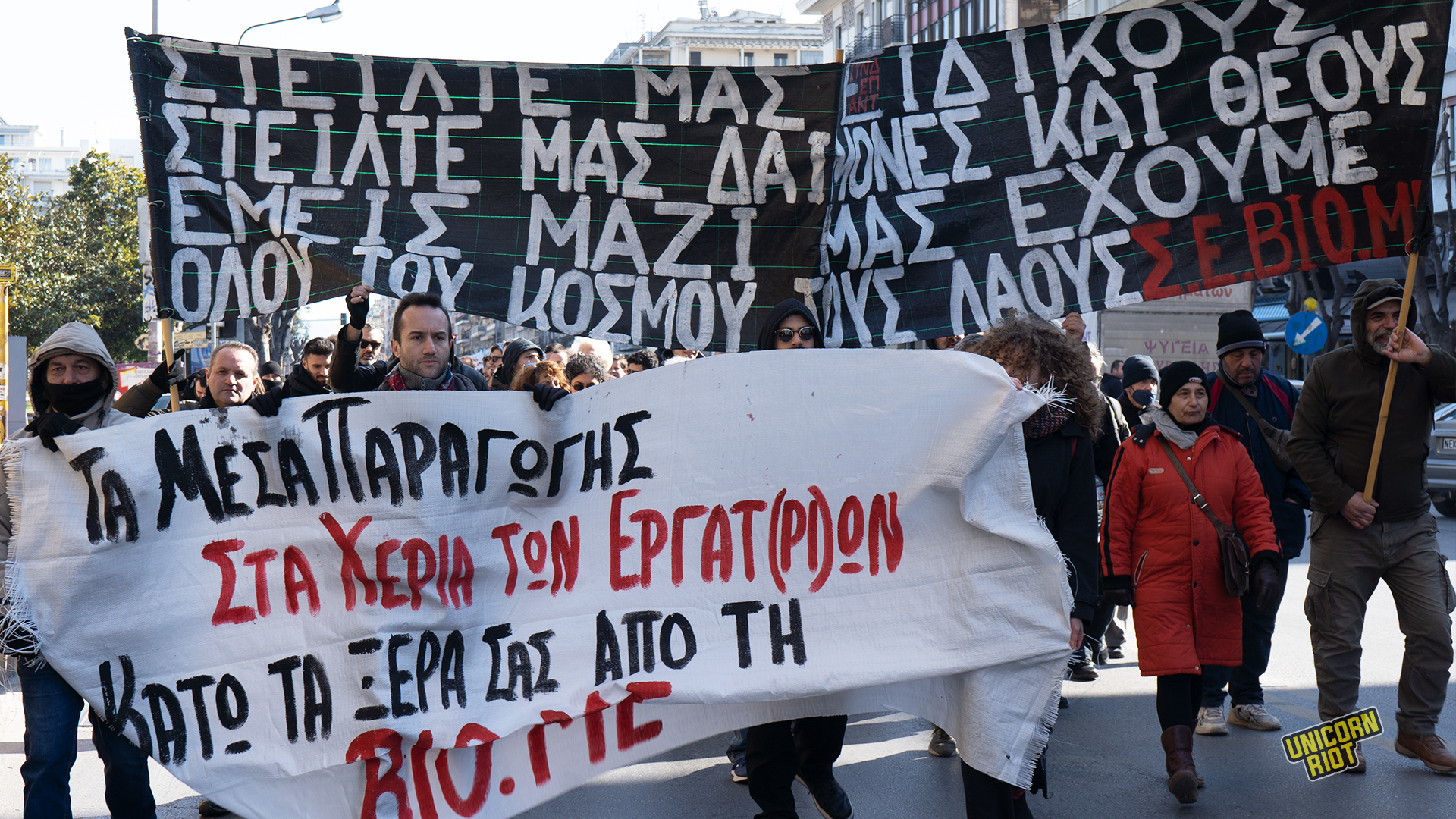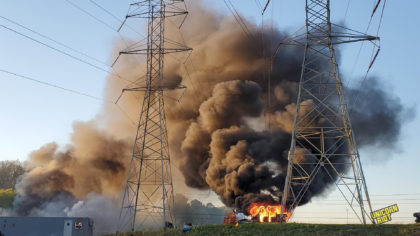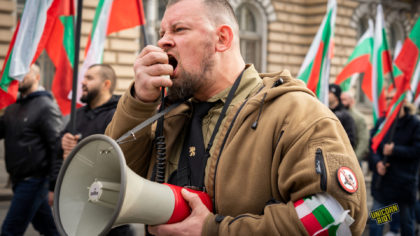‘Don’t Let Them Kill Vio.Me.’ Decade-Long Greek Factory Occupation Threatened
Thessaloniki, Greece – In a surprise announcement on Feb. 3, the workers of the reclaimed worker-run factory of Vio.Me. in Thessaloniki, Northern Greece, disclosed that the land on which the factory stands has quietly been sold at an online auction. The buyer is Acsion Limited, a South Africa-based company owned by Greek expatriate Kiriakos Anastasiadis. The workers of the collectivized factory made it clear that they would not leave without a fight, and called for solidarity actions and support.
The land on which the factory resides is owned by Filkeram-Johnson, Greece’s first ceramic tile manufacturing plant which has owed money to the government, private individuals, and its workers since 2011. State-run auctions of the land Vio.Me. resides on have taken place since Nov. 2015. Courtrooms have been continually packed by Vio.Me. workers and community members ready to physically block any sale on the space, had it occurred. More recently, the auctions have been held on state-run electronic platforms — such was the case with the recent sale of the land on Feb. 1, 2023.
During a large solidarity march in Thessaloniki on Feb. 11, Makis Anagnostou, one of the original workers of the occupation, told Unicorn Riot that the workers have “declared” they “will not leave the place unless [they] are tied up or lying down.”
“After the sale of the Filkeram site in a devious way, because it has been done completely in secret through the electronic auctions, we have decided not to surrender, not to give up the spaces occupied by Vio.Me. many of which have been opened to society and we will defend this decision to the end.”
Makis Anagnostou, worker at Vio.Me. since before the occupation in 2013
Occupy, Resist, Produce: Inside the Self-Managed Factory of Vio.Me.
Workers Healthcare Center of Vio.Me., Created by the Workers for the Community
The Vio.Me. (Viomichaniki Metaleftiki) factory was created in 1982 to produce adhesives. It was a subsidiary of Filkeram-Johnson, which was once Greece’s largest tiles producer before the company filed for bankruptcy in 2011 leaving the factory without an owner. At that time, 25 of its employees decided to take action and attempt to continue production in the factory on their own by forming a cooperative. They reopened the factory themselves in 2013.
For the last ten years, the workers have continued to work using a small piece of the factory space. They do not produce building materials as before, but biological soap, detergents and dish and laundry liquids. They changed the object of production, offering natural cleaning products to society, meeting real social needs, and helping to manage the waste of the olive oil industry, in association with the producers, outside of the commercial cartels.
A few years ago, Unicorn Riot took a tour of the factory. See Vio.Me.’s website here.
Under Vio.Me.’s self-management system, the work is shared by everyone and decisions are made collectively, in a direct democratic process. The reclaimed factory functioned without bosses, with self-management through the workers’ assembly while the factories in the region were closing one after another.
Workers marketed their products abroad and sparked a huge wave of solidarity all over the world, from Latin America, to Australia, to northern Europe.
Anchored within Thessaloniki society, the factory became a space of struggle, creativity and culture; autonomous markets, coordination of workers from reclaimed factories, cooperative projects from all over the world, the first workers’ clinic in Greece, festivals, artistic interventions-graffiti, theatrical performances, screenings, concerts, discussions, and solidarity actions for migrants, all of which attracted visitors from around the world (See our special on the free healthcare clinic that was created at Vio.Me. below)
Thousands of people have participated in these events at the factory and many more have supported the project in the streets, in the coordination of social struggles, in the courts preventing the auctions of the land, outside the ministries, and fighting police repression. Thousands have also taken part in large caravans to show their solidarity with the factory, in Greece and all around Europe over recent years.
#Greece: At a demo organized by those showing #solidarity to the #SelfManaged #Viome factory & committees of the #AntiGold mine struggle in #Thessaloniki–#Halkidiki–#Skouries, we spoke w Maria from @antigoldgreece.
— UNICORN RIOT 🦄 mastodon.social/@UnicornRiot 👈 (@UR_Ninja) December 13, 2018
Follow https://t.co/4dZ6pI4Owr for new specials on both topics. pic.twitter.com/Go1TWPjGDJ
Managing the factory has not been without struggle though. In 2016, the Greek government was thwarted in its attempts to cut the power off to the factory. But three years ago they were successful. As the coronavirus pandemic was devastating Greece, the Public Power Corporation, accompanied by two vehicles with riot police, cut the power to the factory. Despite operating on electric generators, workers donated 1,500 bars of soap to refugees in the overcrowded Moria Refugee Camp (before the camp burned down later that year).
Greek Government Cuts Power to Worker-Run Factory in Midst of Pandemic
Worker-Occupied Factory Sends Soap to Refugee Camp – Coronavirus in Greece, Part 2
Since the sale and the announcement, solidarity actions and assemblies (meetings) are happening frequently in Thessaloniki. In a statement made on Vio.Me.’s website and Facebook page, they’ve gathered the support of 31 cooperative ventures from across Greece.
As of now, eviction plans are unknown. Workers have meet with the buyer once over the phone so far and were able to voice their declaration that they were intending to stay. A follow up meeting is likely to take place in the next months. You can follow Vio.Me. (ΣΕ ΒΙΟΜΕ) on social media for updates directly from the workers themselves.
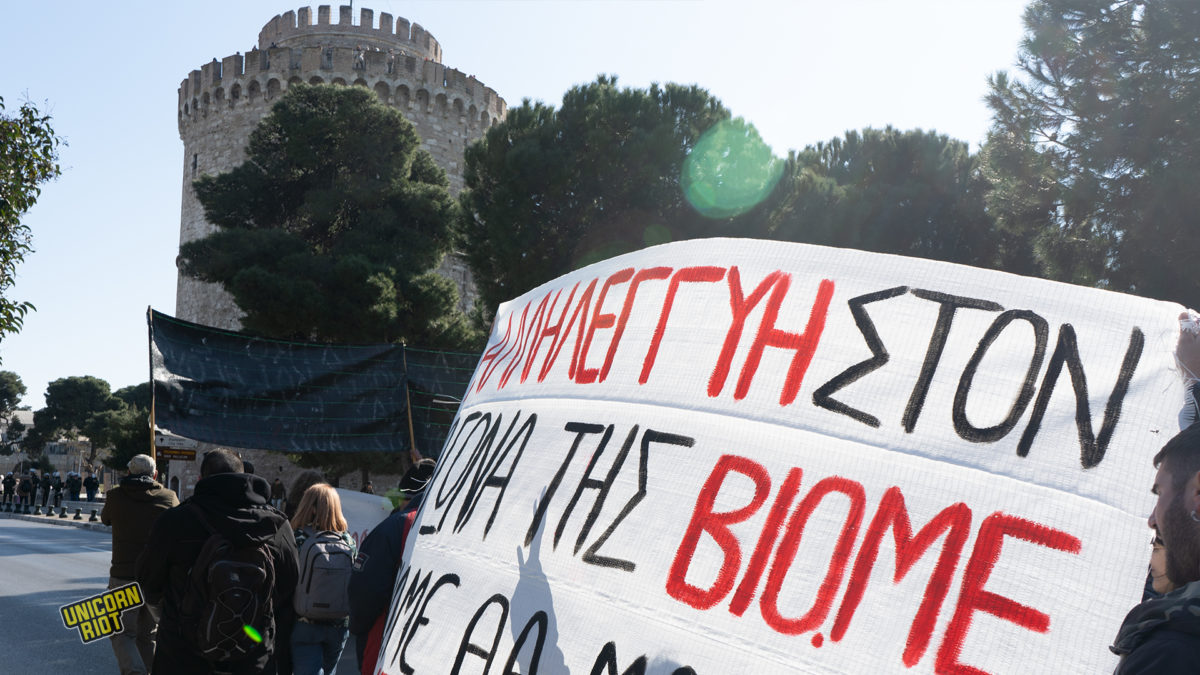
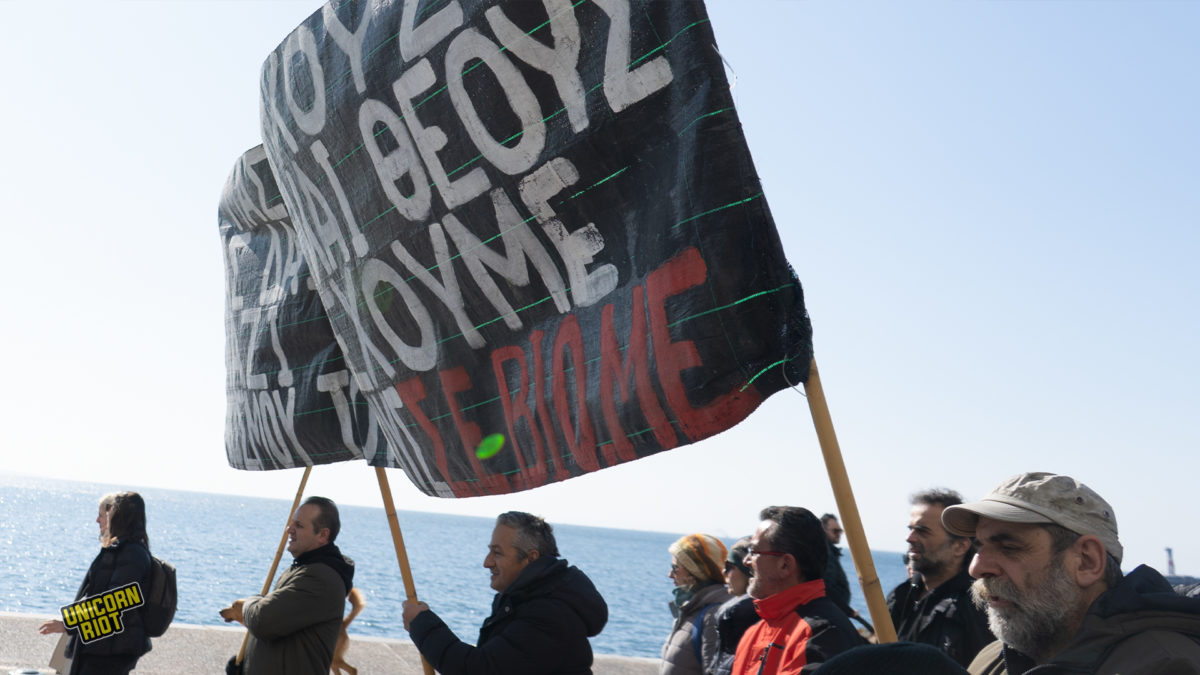
For more from Greece, see our archives.
Follow us on X (aka Twitter), Facebook, YouTube, Vimeo, Instagram, Mastodon, Threads, BlueSky and Patreon.
Please consider a tax-deductible donation to help sustain our horizontally-organized, non-profit media organization:

